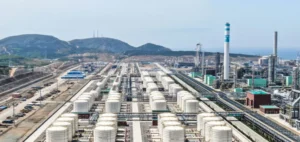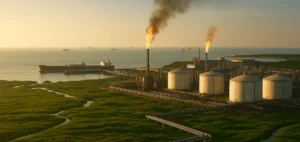Recent data from the U.S. Energy Information Administration (EIA) show a significant decrease in U.S. commercial crude oil reserves.
For the week ended August 2, 2024, reserves fell by 3.7 million barrels, far surpassing analysts’ forecasts of a 1.8 million-barrel drop. This marks the sixth consecutive week of declining inventories, which now stand at 429.3 million barrels, some 6% below the five-year average.
By contrast, gasoline stocks rose by 1.3 million barrels, against expectations of a 1.8 million-barrel decrease.
This increase in gasoline reserves, combined with the continuing decline in crude oil inventories, highlights the contrasting dynamics of the US domestic market.
Crude oil production and demand
U.S. crude oil production continues to grow, reaching a new high of 13.4 million barrels per day (mb/d).
At the same time, demand for refined products fell slightly to 19.97 mb/d from 20.72 mb/d the previous week.
The four-week average, a more stable market indicator, shows a 2% year-on-year drop in demand to 20.29 mb/d.
These data indicate a growing complexity in the balance between supply and demand.
Despite record production, falling demand and shrinking inventories raise questions about the sustainability of this trend and its long-term impact on oil prices.
Impact on the world oil market
Fluctuations in US crude oil inventories are having a significant impact on the global energy market.
The EIA data contributed to a rise in oil prices, which were already influenced by geopolitical tensions in the Middle East.
A barrel of West Texas Intermediate (WTI) for September delivery rose by 1.99% to $74.66, while North Sea Brent crude for October delivery climbed by 1.97% to $77.99.
In Libya, the National Oil Company (NOC) announced a partial suspension of production at the al-Sharara field, due to protests at the site.
This oilfield is operated jointly with Repsol and Total, further disrupting global oil supply.
Analysis of future trends
The continuing reduction in US crude oil inventories, combined with record production, indicates a complex situation for the oil market.
Analysts expect this trend to continue, influencing the strategic decisions of players in the energy sector.
Geopolitical tensions and production disruptions in key regions such as Libya could accentuate this volatility, affecting supply and investment strategies in the short and medium term.
Analysis of future trends highlights the importance of ongoing monitoring of EIA’s weekly data.
This monitoring is crucial for anticipating price movements and adjusting supply strategies.
In addition, US energy policies and global market reactions to inventory fluctuations will play a decisive role in stabilizing or accentuating current trends.
These current crude oil market dynamics underline the need for agile and informed management of energy resources, taking into account the internal and external factors influencing the sector.




















